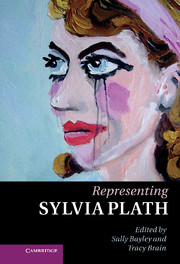Book contents
- Frontmatter
- Contents
- Illustrations
- Notes on contributors
- Acknowledgements
- Abbreviations
- Introduction
- Part I Contexts
- Part II Poetics and composition
- Part III Representation
- Chapter 9 Confession, contrition and concealment: evoking Plath in Ted Hughes’s Howls & Whispers
- Chapter 10 Fictionalizing Sylvia Plath
- Chapter 11 Primary representations
- Bibliography
- Index
Chapter 9 - Confession, contrition and concealment: evoking Plath in Ted Hughes’s Howls & Whispers
from Part III - Representation
Published online by Cambridge University Press: 07 September 2011
- Frontmatter
- Contents
- Illustrations
- Notes on contributors
- Acknowledgements
- Abbreviations
- Introduction
- Part I Contexts
- Part II Poetics and composition
- Part III Representation
- Chapter 9 Confession, contrition and concealment: evoking Plath in Ted Hughes’s Howls & Whispers
- Chapter 10 Fictionalizing Sylvia Plath
- Chapter 11 Primary representations
- Bibliography
- Index
Summary
The publication of Ted Hughes’s Birthday Letters in January of 1998 was a major event, and not only in terms of its literary significance. In anticipation of its publication, the London Sunday Times’s 17 January headline for its Books Section read ‘Tragic Affair: The Literary Love Affair That Turned to Tragedy’, with subheadings borrowed from the poems but worthy of a tabloid: ‘Scar from the past warned: stay clear’ and ‘Bite left tooth-marks on his cheek’. In contrast, when later in the spring of 1998 Hughes published a second volume of poems, Howls &Whispers, it was barely noticed – probably because it was published in a costly limited edition (110 copies by the Gehenna Press) meant for special collections. This volume consists of eleven poems with illustrations by Leonard Baskin that run the gamut from morbid to bloodcurdling. Seven of these poems are addressed to Plath, as are most of the Birthday Letters, while four of them look retrospectively at himself and as something of a fool: ‘a befogged buffoon’ who cannot decipher ‘what’s eating his wife’ is how he describes himself in ‘The Hidden Orestes’. Hughes’s motives for writing these poems also seem somewhat different from those for Birthday Letters. For Hughes, Birthday Letters were hardly poems in the usual sense, but, in his words, ‘occasions … in which I tried to open a direct, private, inner contact with my first wife … thinking mainly to evoke her presence to myself, and to feel her there listening’. In a letter to a friend, read by Frieda Hughes at the Whitbread Prize ceremony three months after Hughes’s death, Hughes explains the necessity for publication as the need for catharsis:
I think those letters do release the story that everything I have written since the early 1960s has been evading. It was a kind of desperation that I finally did publish them – I had always just thought them unpublishably raw and unguarded, simply too vulnerable. But then I just could not endure being blocked any longer … Even now the sensation of inner liberation – a huge, sudden possibility of new inner experience. Quite strange.
- Type
- Chapter
- Information
- Representing Sylvia Plath , pp. 167 - 182Publisher: Cambridge University PressPrint publication year: 2011



